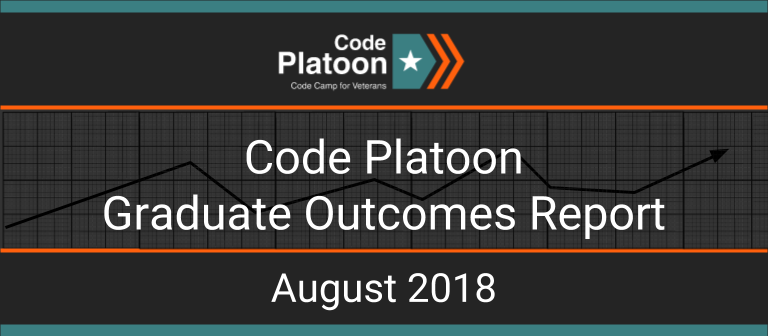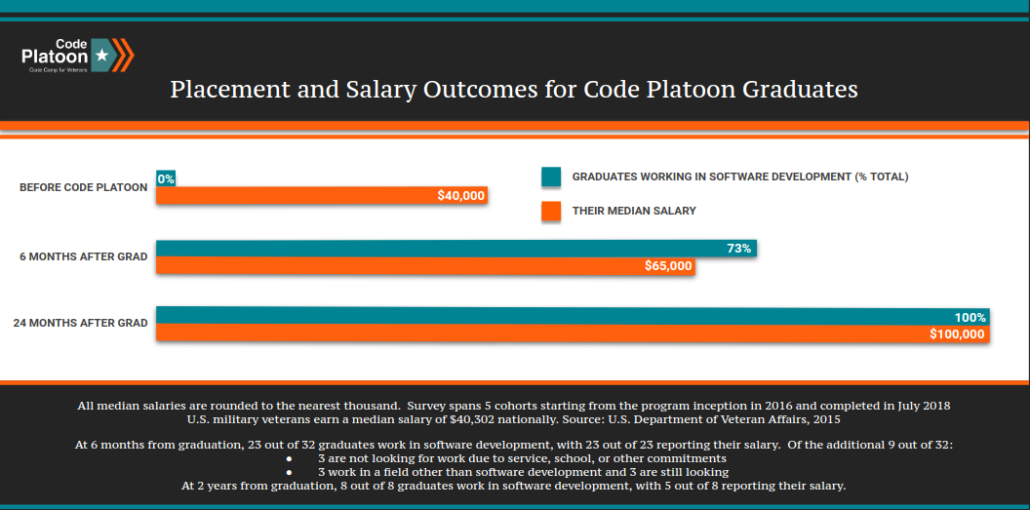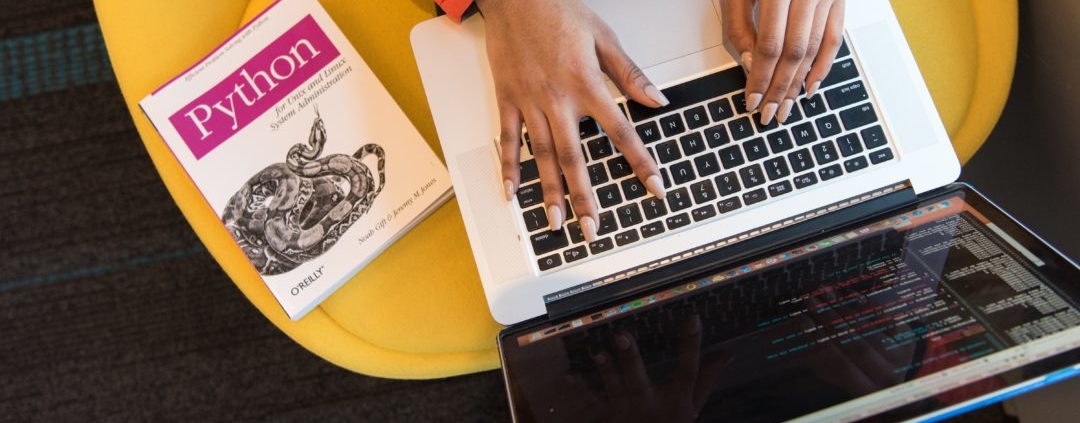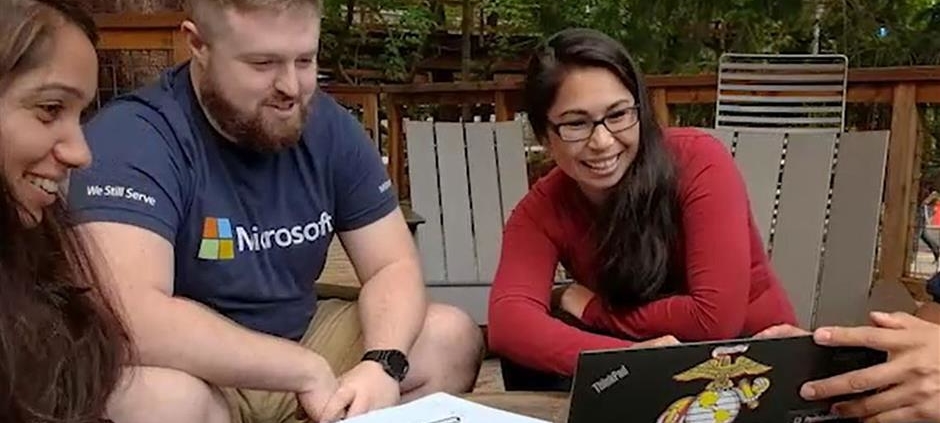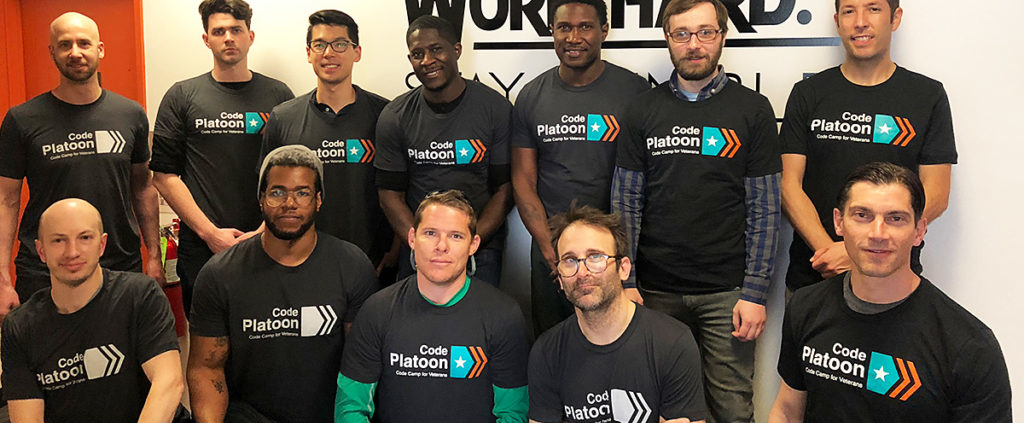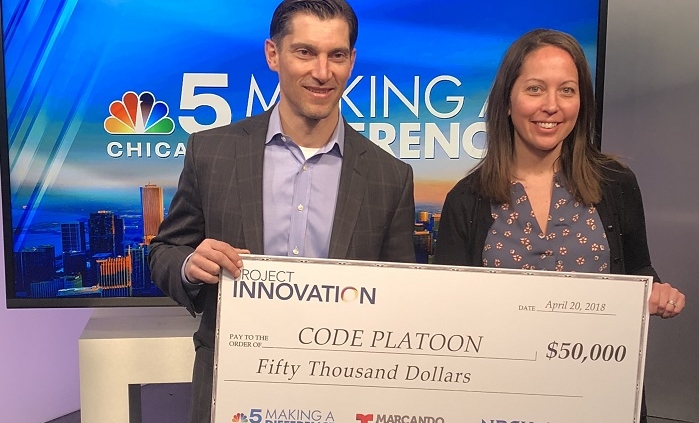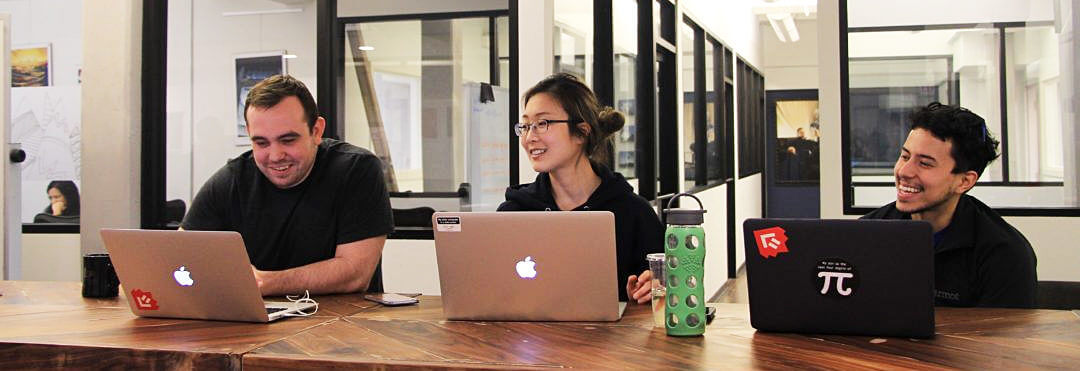Rod Levy is the Founder and CEO of Code Platoon. The following is a reproduction of a podcast he completed with host EdTech Times, which is posted here:
https://edtechtimes.com/2018/05/31/code-platoon-coding-bootcamps/
Over the past decade or so, coding bootcamps have risen in popularity, seen as the ideal route to gain new skills for an in-demand career.
Rod Levy founded Code Platoon to bring those skills to one group in particular: Veterans and military spouses. According to Rod, it felt right to create a skill-building technology bootcamp for people who have already been through literal bootcamps.
“We asked them to work 12-hour days, six days a week, sometimes more. And we’ve had terrific success,” Levy says. “They thrive in this environment. When you think about the characteristics that the veterans brings to the table, you think about teamwork, you think about grit, you think about determination. And that’s exactly what we screen for.”
While a formal education can pave the path to a good career, sometimes higher ed focuses more on theory than practice. After graduation, students might still have to learn skills on the job. Rod says Code Platoon focuses on career services, to help place veterans and military spouses in the workforce with skills they can use right away.
“We spend a fair amount of time talking about how you prepare your LinkedIn profile, how do you prepare your resume preparation, Levy says. “We do technical interviewing, we do non-technical interviewing, and we do personality interviewing. So, we have a full career preparation component as our curriculum.”
Listen in to our full interview with Rod Levy to learn more about coding bootcamps and how they can provide resources for veterans or military spouses and others looking to change their career paths.
Hester Tinti-Kane: This is Hester Tinti-Kane with EdTech Times. Today we’re speaking with Rod Levy, founder and executive director of Code Platoon. Rod, can you start by introducing yourself and telling us a little bit about Code Platoon?
Rod Levy: I am an industry career changer. I was in finance for about 20 years and I went through what was then one of the very first coding bootcamps. And I decided that it was a wonderful, transformative event for me and something that I wanted to bring to a population that I cared about, which was veterans. So, I formed Code Platoon a couple years ago to bring this type of education and job training to people that have served our country.
Hester Tinti-Kane: So, tell us a little bit more about that inspiration for starting Code Platoon?
Rod Levy: I had been in finance for a long time, and I was done with that part of my life for a while for a variety of reasons. I wanted to be able to build things and I decided that if I was going to build things and build companies, I needed to know how to build software. And I spent a long time trying to figure out how to become a software developer. And ultimately I came across a coding bootcamp, Dev Bootcamp was what it was called, it was the very first kind of bootcamp out there. Their premise was, “If you come to our program, if you are admitted and you go through our nine week training program, it’s very immersive, you’ll be working—doing nothing but working on this for nine weeks, figure 12 hours a day, six days a week. But when you’re done you’ll be ready to be a junior developer, you’ll be ready to write code, and ready to work on a software team as a junior software developer.” And so that was an opportunity for me to make a complete pivot, and I was just amazed by the opportunities afforded to me and to my fellow students when I was done.
Rod Levy: The only problem with that bootcamp, well not really a problem, it’s the reality, that it is a for-profit institution. And I’m all for for-profit institutions, but they charge the tuition of about 13 or 14 thousand dollars, which is still a really good deal for many, many people, because you got to change careers into a really energized, well-compensated career. But still out of reach for many people. So, I wanted to bring that type of education to a population that sometimes can’t afford it, many times, and make it affordable for them. So, I decided to start a coding bootcamp for veterans as a nonprofit to signal to them that we’re here to serve the veterans. And something that was affordable and tailored to their background and experiences.
Hester Tinti-Kane: It is really interesting, I think, what boot camps provide for people in such a short amount of time, usually reasonable tuition. But when you were thinking about a career shift away from finance did you consider getting an associate’s degree or going back for college, some sort of, you know, bachelor’s science, computer science? Did you consider that at all?
Rod Levy: Absolutely.
Hester Tinti-Kane: That was early on right? For coding boot camps? And that was sort of—you were taking a risk there maybe.
Rod Levy: Yeah. I mean, I have an undergraduate degree in engineering and I have a couple master’s degrees in business and in engineering, so I’m very comfortable with the path that a formal education can lead you to. And I spent a decent amount of time trying to explore online options, massive online classes, different types of online programs that were free or paid. And I definitely considered going back to get a master’s degree in computer science. The two reasons that I decided not to go that path, one was that typically those tracks are two years, they can be as short as one. And typically they focus much more on theory rather than practice. I wanted to go out and build code. I didn’t want to come out and then have to still learn how to build code.
Rod Levy: Dev bootcamp promised to teach you the tools, like how to be– the analogy we use is, “You can choose to go learn how to be an architect or how to be a carpenter, they teach you how to be a carpenter, you can build stuff when you’re done.” And so that’s what motivated me to go through that Dev Bootcamp even though it certainly was a risk. But they were very thoughtful about the curriculum they put together and it certainly seemed like they had had some good success already even though it was very early.
Hester Tinti-Kane: Let’s talk a little bit about the audience for a Code Platoon, about veterans. Why do you think this type of a learning experience is good for that population, good for veterans?
Rod Levy: The term “coding bootcamp” originated before anyone thought about targeting veterans, so clearly there’s something about the naming that Dev Bootcamp and other coding bootcamps were trying to message, which is that to be successful through their program it was going to take a tremendous amount of work. It was going to be very rigorous. It seemed to me that if I was going to start a bootcamp, all things being equal, it would be easier if I just tried to target individuals that had already been through a real bootcamp. Our program is exceptionally rigorous. We asked them to work, again, 12 hour days, six days a week, sometimes more. And we’ve had terrific success. They thrive in this environment. You know that when you think about the characteristics that veterans brings to the table, you think about teamwork, you think about grit, you think about determination and that’s exactly what we screen for. And that’s exactly what we see in our classrooms. I think that certainly those characteristics you see in veterans much more readily than you would out of just a civilian in the general population.
Hester Tinti-Kane: Do you have maybe a specific story that you could tell about one of the students that came through your program? Sort of, what was their previous experience, what was their learning experience, and then how did they move on after that?
Rod Levy: First of all, we get all kinds of backgrounds, all kinds of ages, but most of our students reflect the military population as a whole, which means that about 80 or 90 percent of them were enlisted. They were not officers. And about 80 percent of those don’t necessarily have college degrees. Most of them have high school degrees. The gentleman that I like to think about in terms of someone who was the kind of individual we were targeting was somebody who three years ago was doing blue collar work. I think he was stacking boxes at UPS. And he applied to our program, he got in, didn’t even finish high school. And it was very clear from when you saw the way he wrote, the way he talked that, this is a very intelligent, articulate young man for whom life circumstances haven’t naturally played out as well as they did for others. And he went through our program. He just finished it successfully. He got an internship through one of our sponsor companies, and not just one of sponsor companies, but one of the companies that is truly one of the technology beacons in Chicago. This is a company that they hire and compete against Facebook and Google in terms of talent, in terms of what they pay. And so when he was placed in an internship there, it was clear that they wanted to support him, but they didn’t necessarily expect that he was going to be a long-term fit. And yet, here we are today, a little over a year later, and he is a full-time employee there doing extremely well and he has opportunities available to him now that he wouldn’t have had ever before.
Hester Tinti-Kane: That’s great. Tell us a little bit more about how you connect your students to jobs.
Rod Levy: We have multiple components to our curriculum that help prepare students for the next phase professionally. The most direct one is that we have sponsor companies who commit to provide internships for our students. We don’t have enough internships for all of our students, but for those that get placed at companies, once you make it into an internship, the likelihood that you end up working successfully in the field is very high. It’s usually that first year after coding bootcamp that is the biggest hurdle to long-term success. Companies are desperate to hire software engineers. But they’re also desperate to hire ones that can do the work reasonably early. And that isn’t usually the ones to come out after one year, or just after the coding bootcamp.
Rod Levy: Now, the other components of our program involve a fairly rich career services curriculum. So we spend a fair amount of time talking about how you prepare your LinkedIn profile, how do you prepare your resume preparation. We do technical interviewing, we do non-technical interviewing, and we do personality interviewing. So we have a full career preparation component as our curriculum. And then we also have a soft skills component to our curriculum, which is not directly career services but it’s about, “how do you succeed in the workplace beyond the technical skills?” And then lastly, we also are working on having a career coach, technical recruiting component after you finish our program to help make sure that if you didn’t get an internship, now we have someone helping you through, put a plan together and execute so that you can find your job.
Hester Tinti-Kane: So tell us a little bit about your corporate sponsors and what’s in it for them?
Rod Levy: Most of these companies are Chicago-based, although we are definitely looking to partner with companies outside of Chicago as well. And the common characteristic is that they are tech-enabled, but not necessarily tech companies, but they have a tech team. They’ve identified the need to grow their talent internally and organically. And what’s in it for these companies? It really depends on the company. Some companies are mission driven. They want to support veterans and they see that our program is an opportunity to solve not just unemployment but underemployment. There’s a lot of programs trying to help veterans and many of them are absolutely wonderful. We try to take it one step higher because we’re training our veterans to become the real cream of the technology crop.
Rod Levy: But for these companies, the commitment they make financially and to hire an internship, at the end of the day, if they try to compare that relative to the recruiting budget, it comes out to be about the same from a cost perspective, only they get to support a nonprofit that is helping veterans. And they get to have a talent pipeline of well-trained junior software engineers who bring to the table the characteristics that they’re already screening for. Any CTO in Chicago’s going to tell you, “we’re looking for individuals that can work in a team. We’re looking for individuals that can step into a leadership role, that we’re looking for individuals that are cool under pressure.” Now, it’s hard to screen for those characteristics, but I can tell you most of our students go through and check every box because of their service. So, we’ve done a lot of hard work for the company. All they have to do is work with us and make sure that we’re all aligned in terms of how to get these men and women into their career.
Hester Tinti-Kane: So, tell us a little bit about the costs to the students, and how the costs are defrayed by some of the corporate sponsors we were just talking about.
Rod Levy: Absolutely. So, our tuition is $13,000—very much in line, or a little bit less, than the best coding bootcamps that you’ll find. And we compare ourselves to the best. We offer the same type of instructions, same length of program, same immersion. Our curriculum, I think, is second to none. But all of our veterans coming in for 2017, and I think for much of 2018, are assured of ten thousand $500 scholarships. So, out of pocket to them: $2,500. We also have a Women in Technology Scholarship, which is a full ride for one woman in this class, and hopefully we’ll be able to repeat that. And we have other scholarships as well. We have a full-ride transgender scholarship. And this funding comes from a couple different sources, but the companies that support us make a financial contribution and that goes to our pool to defray our operating expenses, and which is why we’re able to offer these generous scholarships for our veterans.
Hester Tinti-Kane: That’s great. Do they use any level of financial aid, like do they tap into those funds as well?
Rod Levy: Yeah. So, right now the primary form of financial aid that a veteran might look for would be to access the G.I. Bill. And the G.I. Bill is a very generous program that covers educational costs and living and housing stipend as well. We will be eligible to apply in January to receive G.I. Bill funds. If we are approved, then that would open up the door for veterans to be able to use your G.I. Bill benefits with our program and give, you know, obviously give them even a greater form of financial assistance than what we can offer today.
Hester Tinti-Kane: Now I guess one final piece, as we’re talking about it, we mentioned Chicago a number of times but we haven’t talked too much about the location of where Code Platoon is and what sort of modalities of learning you’re using there. Is it face-to-face only? Is there something that’s partially online?
Rod Levy: Our program is designed to be an in-person program, and we feel that education is best delivered in-person. It’s hands-on learning, so we spent a couple hours a day doing a lecture style presentation, and the rest of the day is hands-on project learning. However, we recognize that there are veterans for whom traveling here is prohibitively difficult, whether because they can’t afford to travel or because they’re disabled. And so we’re trying to accommodate more of those veterans by offering a concurrent remote option where they attend the class remotely. They still participate in the program. They’re just not physically here. We also have entire first weeks of our curriculum available online. Anybody can access it. Anybody can go through it. And if you’re a veteran and you make it those first three weeks, and you want to see the next nine weeks we’ll make that available to you and it’s all for free. We really just want to expand this form of education.
Hester Tinti-Kane: Great. So, how many students have gone through the program so far?
Rod Levy: We graduated our first class last year. That was eight students. Earlier this year we graduated our second class. First class was Alpha Platoon. We graduated Bravo Platoon with 11 students, and we currently have Charlie Platoon with six. And we’re soon closing applications for Delta Platoon. That will be September through December cohort.
Hester Tinti-Kane: So, in terms of your student population how many women are involved in Code Platoon?
Rod Levy: So, we have tried to engage women veterans into our program. I think we’re doing a good job relative to the tech industry, but not nearly as good a job as we want to. We’ve had one woman per cohort so far, that’s about 15 percent of our population has been women. We did launch this full Women in Technology Scholarship recently and we’re getting a very good response. So I’m optimistic that we will be able to increase those numbers going forward. We do have pretty good minority and underrepresented groups engagement into our program. And it’s something that we will continue to try to improve.
Hester Tinti-Kane: What are your plans for the future? What do you see happening next?
Rod Levy: I think that we will continue to slowly and thoughtfully increase the amount of veterans we serve in Chicago. Probably expand a little bit our remote options. And we’re looking obviously to flesh out parts of the program that we think need help, and we might even build an apprenticeship program sometime down the line. But our goal is to make sure that the few veterans that we do serve, we serve extremely well. And we make sure that they are launched into a career. And then we ask them to come back and help out our new veterans.
Hester Tinti-Kane: So, if people want to learn more about Code Platoon, where should they go?
Rod Levy: It’s all on the website, codeplatoon.org. But if there’s anything that they would like to know I can always be reached at rod@codeplatoon.org.
Hester Tinti-Kane: Where can someone find Code Platoon in Chicago?
Rod Levy: So, if you want to come visit our offices, or grab a cup of coffee with me, we’re at 73 West Monroe right on the corner of Clark and Monroe. We’re there five days a week.
Hester Tinti-Kane: Well, thanks so much for spending time with us today. Good luck with your program.
Rod Levy: Thank you very much, I appreciate all of your questions.


